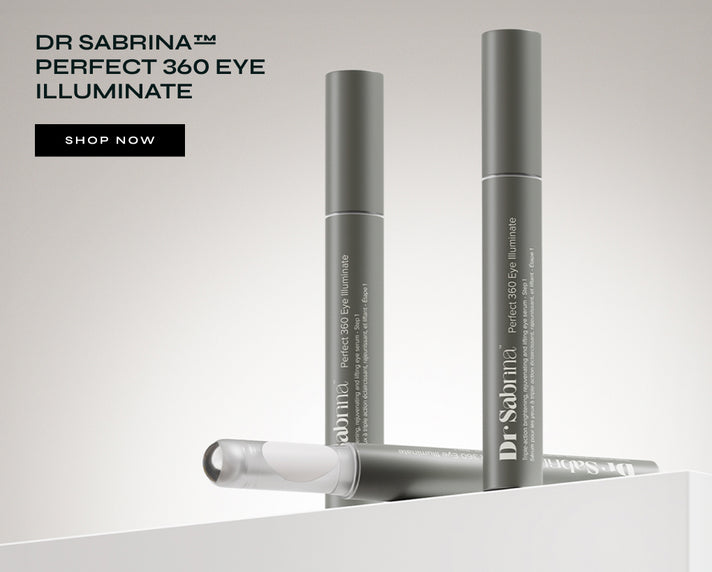Eye Serum
Does Vitamin C Help With Hyperpigmentation?
4 min.
If you've ever stared at persistent dark spots in the mirror, wondered, "Does vitamin C help with hyperpigmentation-or am I wasting my money?"-well, you're not alone. Hyperpigmentation is one of the most common skin concerns; it can make your skin appear uneven, dull, or patchy. And with so many serums on the market touting their brightening powers on your face, it's easy to be befuddled about what actually works.
Vitamin C is at the top of nearly every dermatologist's recommended list-but why does it work, how does it work, and what concentration should you pick for stubborn pigmentation?
Let's break it down in a simple, expert-backed way.
Does Vitamin C Help With Hyperpigmentation?
Yes, it does.
Vitamin C, also known as ascorbic acid, is a powerful ingredient for improving skin health and texture. It acts as an antioxidant and protects the skin from free radical damage. One of its key benefits is reducing hyperpigmentation and brightening skin tone. Vitamin C helps to lighten dark spots and even out skin tone by inhibiting the enzyme that produces melanin, which causes pigmentation. It also promotes collagen production, which can help repair and rejuvenate the skin. Additionally, Vitamin C can reduce inflammation and protect against UV damage, further aiding in the fight against hyperpigmentation.
For best results, choose a stable Vitamin C product, store it properly, and use it consistently. Always consult your doctor for personalised skincare advice.
Benefits of Vitamin C for Hyperpigmentation
Know the benefits of Vitamin C including reducing dark spots, brightening your skin tone, and much more -

Vitamin C is a strong antioxidant that combats free radicals created by UV exposure, pollution, and environmental stress. These free radicals can damage skin cells and speed up ageing. By neutralising them, vitamin C helps protect your skin from oxidative stress and supports a healthier, more even complexion.
Collagen Production
Vitamin C is very important for producing collagen, a protein that gives skin its strength and elasticity. It helps activate enzymes necessary for collagen formation, which keeps the skin firm and youthful. By boosting collagen production, Vitamin C helps maintain the skin’s firmness and resilience.
Reduction of Melanin Production
Vitamin C plays a key role in controlling melanin, the pigment responsible for skin colour. It works by blocking tyrosinase, an enzyme needed for melanin production, and helps lighten dark spots. By doing so, vitamin C helps reduce excess pigmentation and promotes a more even skin tone, which makes it effective in diminishing dark spots and improving overall skin brightness.
Wound Healing
Vitamin C helps with wound healing by building strong collagen, which is needed to repair and fix damaged skin. This vitamin supports the production of collagen, a protein that strengthens the skin and aids in its repair. Also, Vitamin C boosts the migration and growth of skin cells, which speeds up the healing process and improves skin resilience.
Anti-Inflammatory Properties
Vitamin C possesses strong anti-inflammatory qualities that help calm and reduce inflammation in the skin. This is particularly helpful for individuals dealing with inflammatory skin issues like acne, redness and irritation. By decreasing inflammation, Vitamin C not only alleviates discomfort but also promotes healthier and clearer skin overall.
UV Protection
While Vitamin C isn’t a substitute for sunscreen, it provides added UV protection. It helps to lessen the damage caused by UV rays by reducing the formation of free radicals and slowing down collagen breakdown. This extra layer of defence supports healthier skin and helps prevent some of the effects of sun exposure.
Regeneration of Vitamin E
Vitamin C helps restore vitamin E, another key antioxidant that supports skin health and reduces hyperpigmentation. Vitamin E protects cell membranes from oxidative damage and supports overall skin health. By helping to restore vitamin E, vitamin C enhances the skin's overall antioxidant defence system, which boosts its ability to combat environmental damage and maintain a healthier, more radiant complexion.
Enhanced Cell Turnover
Vitamin C supports the natural exfoliation process, which encourages the removal of dead skin cells. This increased cell turnover diminishes the appearance of dark spots and reveals fresher, more even-toned skin by promoting the growth of new, healthy skin cells.
Vitamin C For Dark Circles
Vitamin C is effective in reducing dark circles and brightening the under-eye area. It boosts collagen, improves skin tone and helps diminish the appearance of dark circles for a refreshed look. Use the best eye serum, containing vitamin c, to get amazing results.
How Vitamin C Works on Pigmentation: The Science and Mechanism
Vitamin C is a potent antioxidant, but the real magic lies in how it interacts with your skin's melanin-forming process.
Melanogenesis
Melanogenesis is the scientific term for how your skin produces melanin pigment, responsible for your natural skin tone… and also for dark spots and pigmentation on the face. When the skin undergoes inflammation, sun exposure, or hormonal changes, melanocytes produce more melanin, which causes uneven patches to appear.
The Role of Tyrosinase
Tyrosinase is the enzyme responsible for initiating melanin production. This, in essence, is the “switch” that turns on pigmentation.
When tyrosinase is active, you get more melanin → more pigmentation.
How Vitamin C Inhibits Melanin Production
Here's where Vitamin C becomes a hero ingredient for Vitamin C pigment reduction:
-
It blocks tyrosinase and slows melanin production.
-
In addition, it reduces already-formed melanin, promoting the disappearance of dark spots.
-
Since it's a very potent antioxidant, it protects skin from UV-induced pigmentation.
It enhances collagen, making the treated areas look more radiant and firmer. So yes-vitamin C for hyperpigmentation works, but only when used correctly and consistently.
Best Concentration of Vitamin C for Hyperpigmentation
Not all percentages give the same results. Here's a simple breakdown:
10% Vitamin C
-
Good for beginners or sensitive skin
-
Mild brightening
-
Slower improvement in pigmentation on face
15% Vitamin C
-
Dermatologist-preferred sweet spot
-
Effective for hyperpigmentation and dark spots
-
Good balance between results and tolerance
20% Vitamin C
-
Strong option for stubborn pigmentation
-
Works faster but can cause sensitivity
-
Best for experienced users
Sensitivity Considerations
-
If you have dry or sensitive skin, start with 8–10%.
-
Higher percentages (15–20%) may cause tingling, redness, or dryness.
-
Always introduce vitamin C slowly, especially if you’re treating vitamin C pigmentation concerns.
How Long Does It Take to See Results?
-
2 weeks: Brighter overall skin tone
-
4–6 weeks: Visible reduction in mild dark spots
-
8–12 weeks: Significant improvement in stubborn hyperpigmentation
-
12+ weeks: Best results with consistent daily use
Vitamin C is not an overnight fix, but when paired with sunscreen and consistency, it's one of the most reliable treatments for dark spots and pigmentation on the face.
Who Should Avoid Vitamin C?
Vitamin C is safe for most skin types, but some people should use caution.
1.Sensitive Skin
People with very reactive skin may experience stinging or redness.
Start low (5–10%) and use every other day.
2. Rosacea
Vitamin C can sometimes worsen flushing or burning sensations.
Gentle derivatives like SAP (sodium ascorbyl phosphate) are safer.
3. Patch-Test Instructions (Important)
Before applying vitamin C to your face:
-
Apply a pea-size amount behind your ear or on your jawline.
-
Wait 24 hours.
-
If no redness or burning occurs, it’s safe to use.
How to Layer Vitamin C Properly
Incorrect layering is one of the biggest reasons people ask, Does vitamin C help with hyperpigmentation or not? If you mix it wrong, it can irritate your skin or become ineffective.
AM Routine (Best Practice)
-
Cleanser
-
Vitamin C serum
-
Hydrating serum (optional)
-
Moisturiser
-
SPF 30–50 (non-negotiable)
Do’s and Don’ts
Do:
Use vitamin C every morning
Pair with sunscreen
Keep the bottle airtight (vitamin C oxidises)
Don’t:
Avoid using strong exfoliants on the same day
Avoid layering with high-strength niacinamide if irritation occurs
Never use oxidised (brown) vitamin C it's ineffective
Best Forms of Vitamin C for Pigmentation
Different forms work differently, and knowing the right one helps maximise your results.
1. L-Ascorbic Acid (LAA)
-
The purest, most researched form
-
Best for fast fading of hyperpigmentation and dark spots
-
Works quickly but can be irritating
2. Sodium Ascorbyl Phosphate (SAP)
-
Gentle
-
Great for acne-prone skin
-
Helps with pigmentation on the face caused by breakouts
3. Magnesium Ascorbyl Phosphate (MAP)
-
Hydrating
-
Good for dry/sensitive skin
-
Brightens slowly but steadily
4. Tetrahexyldecyl Ascorbate (THD)
-
Oil-soluble, penetrates deeper
-
Excellent for stubborn vitamin C pigmentation concerns
-
Less irritating than LAA
How To Apply Vitamin C Serum for Best Results?
To fully benefit from vitamin C serum and ensure it works effectively, follow these best practices. Here are some key tips for applying vitamin C serum:
Begin with a Clean Face:
Start by cleansing your skin to remove makeup, dirt, and impurities. Using a gentle cleanser prepares your skin and helps the Vitamin C serum absorb better.
Toner:
If you include a toner in your routine, apply it after cleansing. Toners help balance your skin's pH and provide a smooth base for the next products.
Apply Vitamin C Serum to Dry Skin:
After cleansing, gently pat your face dry before applying the Vitamin C serum. Avoid applying it to damp skin, as moisture can dilute the serum and lessen its effectiveness.
Use the Right Amount:
Follow the product guidelines for the correct serum dosage. Usually, a pea-sized amount is sufficient for the face. Applying too much can lead to irritation without improving results.
Apply and Pat Gently:
Use your fingertips to apply the vitamin C serum, then gently pat and press it into your skin. Focus on areas with hyperpigmentation or uneven tone. Avoid rubbing or massaging vigorously.
Allow Time for Absorption:
Let the vitamin C serum fully absorb into your skin for a few minutes before applying other products. This ensures the active ingredients can penetrate and work effectively.
Apply in the Morning (With Sunscreen):
After using vitamin C serum in the morning, follow up with a broad-spectrum sunscreen. vitamin C enhances sunscreen's effectiveness, offering extra protection against UV rays.
Store Correctly:
Store your vitamin C serum in a cool, dark place, away from direct sunlight. Exposure to light and air can diminish vitamin C's potency and effectiveness.
Stay Consistent:
Incorporate vitamin C serum into your daily skincare routine for optimal results. It may take time to see visible improvements, so remain patient and consistent.
Also Check: When to Use Vitamin C Serum?
Vitamin C For Various Skin Types
Vitamin C benefits all skin types, though specific needs may vary. Vitamin C can be customised to treat normal, dry, oily/acne-prone, sensitive, combination, mature/ageing, and hyperpigmented skin.
Essential Tips for Using Vitamin C on Any Skin Type
Start Gradually:
If you're new to Vitamin C, begin with a lower concentration and increase it as your skin adjusts.
Stick with It:
For optimal results, apply Vitamin C serum consistently as part of your daily skincare routine.
Pair with Sunscreen:
Always use sunscreen, especially in the morning. Vitamin C boosts the effectiveness of your sunscreen.
A Quick Recap
Vitamin C offers numerous skincare benefits beyond treating hyperpigmentation. It provides antioxidant protection, supports collagen production, brightens and evens skin tone, reduces inflammation, boosts hydration, helps in wound healing, and helps protect against sun damage and photoaging. Using vitamin C in your skincare routine enhances overall skin health and addresses various concerns, which makes it a valuable addition whether you are targeting specific issues or seeking a general skin boost.
Tip: If you want to reduce eye puffiness, use an eye-regenerate LED mask along with hydrocolloid patches. To know everything about what are hydrocolloid patches and how they help, skim through our guide!
















